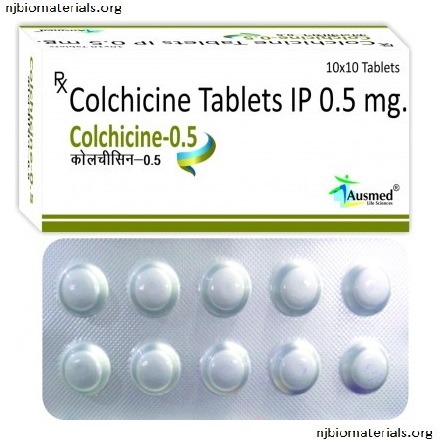Colchicine (Artrichine)
What is Colchicine
Colchicine, known by the brand name Artrichine, is a medication primarily used to treat and prevent gout flares. It is also used for other conditions such as familial Mediterranean fever (FMF) and sometimes in the treatment of pericarditis (inflammation of the sac around the heart).
Colchicine works by inhibiting the migration of white blood cells (neutrophils) to the site of inflammation. When uric acid crystals accumulate in the joints, the body’s immune response sends white blood cells to attack the crystals, causing inflammation and pain. By preventing the white blood cells from gathering in the joints, colchicine helps reduce the inflammatory process, easing the pain and swelling associated with gout attacks. This mechanism makes colchicine effective both for treating acute gout flares and for preventing future attacks.
Recommendations
Colchicine is recommended for several conditions, most notably those related to inflammation caused by crystal deposits. It is commonly prescribed in the following situations:
• Acute gout attacks;
• Gout flare prevention;
• Familial Mediterranean fever (FMF);
• Pericarditis;
• Other inflammatory conditions.
The usual dosing of colchicine varies depending on whether it is being used to treat an acute attack or as a preventive measure. Patients should follow their healthcare provider’s instructions carefully to minimize the risk of side effects.

Precautions and Contraindications
Before starting colchicine, certain health conditions should be taken into consideration, as they may affect the safety or efficacy of the medication. Colchicine may not be suitable for everyone:
• Kidney disease;
• Liver disease;
• Blood disorders;
• Pregnancy and breastfeeding;
• Gastrointestinal conditions;
• Elderly patients may be more susceptible to the side effects of colchicine, especially when taken for long-term prevention.
Your healthcare provider will review your medical history and overall health before prescribing colchicine to ensure it is a safe and appropriate treatment option.
Interactions
Colchicine can interact with other medications, which may lead to changes in its effectiveness or increase the risk of side effects. It is important to inform your healthcare provider of all medications, supplements, and over-the-counter products you are taking. Common interactions include:
• CYP3A4 inhibitors;
• P-glycoprotein inhibitors, like cyclosporine and verapamil;
• Statins (cholesterol-lowering drugs);
• Grapefruit juice;
• Antifungal medications, like itraconazole and fluconazole.
Always provide your healthcare provider with a complete list of your current medications to avoid harmful interactions and ensure the safe use of colchicine.
Side Effects
Like all medications, colchicine can cause side effects. While many are mild, some can be serious and require medical attention. Common side effects include:
• Diarrhea;
• Nausea and vomiting;
• Abdominal pain;
• Fatigue.
More serious side effects are less common but can include:
• Muscle weakness;
• Blood disorders;
• Severe gastrointestinal reactions;
• Neuropathy.
If you experience any severe side effects, such as muscle pain, unusual bleeding, or persistent gastrointestinal symptoms, contact your healthcare provider immediately.
Before You Start Colchicine Treatment
Before starting colchicine, your healthcare provider will evaluate your medical history and discuss any potential risks. This may include:
• Kidney and liver function tests;
• Blood tests;
• Detailed medication review;
• Gastrointestinal assessment.
It is essential to follow your healthcare provider’s instructions carefully and avoid taking more than the prescribed dose, as colchicine has a narrow therapeutic index, meaning there is a small margin between an effective dose and a toxic one.
Overdose
An overdose of colchicine can be dangerous and may lead to serious symptoms such as:
• Severe abdominal pain or cramping;
• Persistent diarrhea or vomiting;
• Muscle weakness or pain;
• Difficulty breathing;
• Unusual bleeding or bruising;
• Confusion or loss of consciousness.
If you suspect an overdose, seek emergency medical help immediately. Overdosing on colchicine can lead to life-threatening complications, including multi-organ failure.